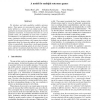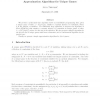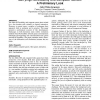1033 search results - page 35 / 207 » Stop the numbers game |
98
Voted
ICTAI
2008
IEEE
15 years 8 months ago
2008
IEEE
We introduce and study qualitative multiple outcomes games. These games are noncooperative games with qualitative utilities (i.e., values over an ordinal scale), strictly qualitat...
109
click to vote
FOCS
2005
IEEE
15 years 7 months ago
2005
IEEE
We present a polynomial time algorithm based on semidefinite programming that, given a unique game of value 1 − O(1/ log n), satisfies a constant fraction of constraints, wher...
NORDICHI
2004
ACM
15 years 7 months ago
2004
ACM
The fields HCI/usability and computer games have existed for a few decades with virtually no mutual interaction. However, in recent years, a number of exchanges have appeared, bot...
116
click to vote
GLOBECOM
2007
IEEE
15 years 7 months ago
2007
IEEE
This paper introduces a new game theoretic formulation for the design and routing of resilient and translucent networks. An integer linear programming (ILP) modeling is also presen...
108
click to vote
SIGECOM
2004
ACM
15 years 7 months ago
2004
ACM
We provide efficient algorithms for finding approximate BayesNash equilibria (BNE) in graphical, specifically tree, games of incomplete information. In such games an agent’s p...



